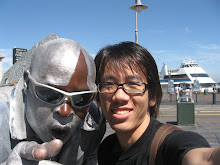The book rants about the evils of religion. In cases where the topic is something I have read about or know somewhat a bit of from elsewhere, I agree with him.
In The "Case" Against Secularism, he discusses the religion supporters', what he calls "last ditch" (page reference needed here), arguments against secularism. My readings have been overlapped with other material such as the works of Dawkins and interpret it to refer to the extremely common case where people say secularism or atheism has brought about great evils. I do not think it is always necessary to extend this to the, unfortunately thanks to dawkin, easily destructible argument that Hitler and Stalin were atheists who brought about the worst atrocities in the 20th century. Nonetheless, these are often the claims. As Dawkins would explain, Hitler was not a atheist. He was a Roman Catholic. Stalin on the other hand is clearly an atheist. However, before we get excited, Dawkins makes it clear that it does not even matter whether they were religious or were atheists. Their motivations were not religious or atheist-ic. Hitchens touches on this but in fact claims that the Catholic church was very much an ally of Nazism. From pages 235 to 252, he discusses how religion played a dirty role with fascism, Nazism, and Stalinism.
But let's not forget the East, to where many Westerners appear to be drawn to in search of spirituality, possibly "those who become bored by conventional 'Bible' religions". In There is no "Eastern" Solution, Hitchens puts Buddhism at fault (though surely not the sole fault, one must always be careful to say lest everything gets simplified) for violent manifestations of the Japanese during the period of WWII. He also criticizes the Dalai Lama (something that makes me smile) and in brief shows that there is nothing any better in Eastern religions. An interesting albeit irrelevant-to-my-discussion anecdote he mentions and I paraphrase goes:
"Make me one with everything." requests the Buddhist humbly to the hot-dog vendor.
The Buddhist hands a 20-dollar bill to the vendor and, in return for his slathered bun, waits a long time for his change. Finally asking for it, he is informed that "change comes only from within."
He puts down the Koran as nothing but badly sewn together myths from the Jews and the Christians. He slams them as having draconian laws out of their insecurity and hardly gives them a breather as he criticizes them to absurdity for their claims to be "final" and for the ridiculous story of Mohammad's night flight.
Of course, Christianity can never be left out in a discussion of this nature especially in America. Many books go into details of the inconsistencies and absurdity of the bible. Hitchens focuses more on the evil stories within them, largely with the stories of mass murdering and forced child sacrifice (almost).
But proofs are not what this book is essentially about. It is a collection of cases which Hitchens argues to be evil caused by religion. Rightly so, since his book is subtitled How religion poisons everything. I feel like I hardly remember anything from this book unfortunately. I need to start taking more notes and talking to myself more when I read more non-fiction.
Friday, October 23, 2009
Subscribe to:
Post Comments (Atom)

No comments:
Post a Comment